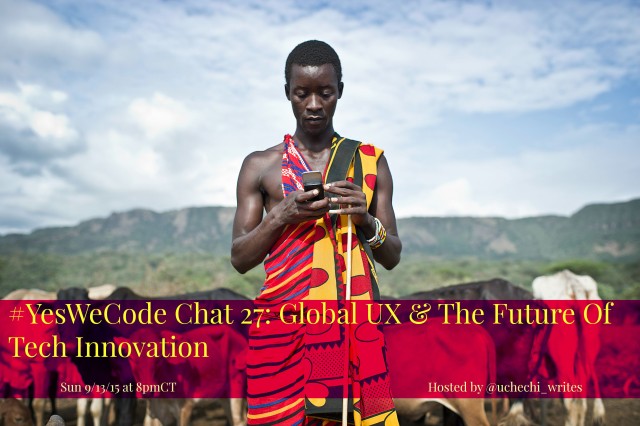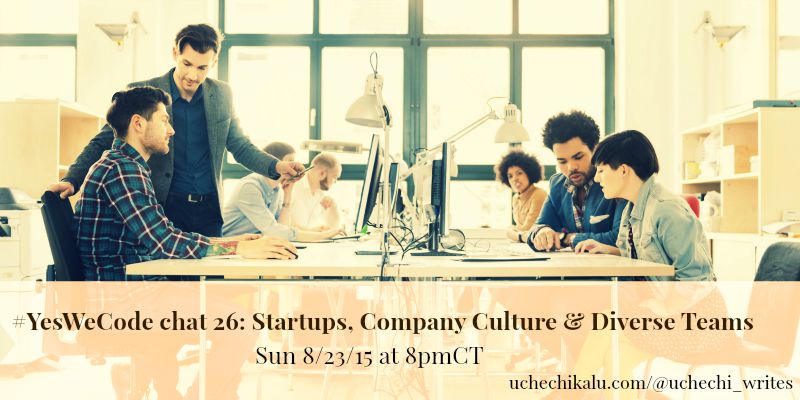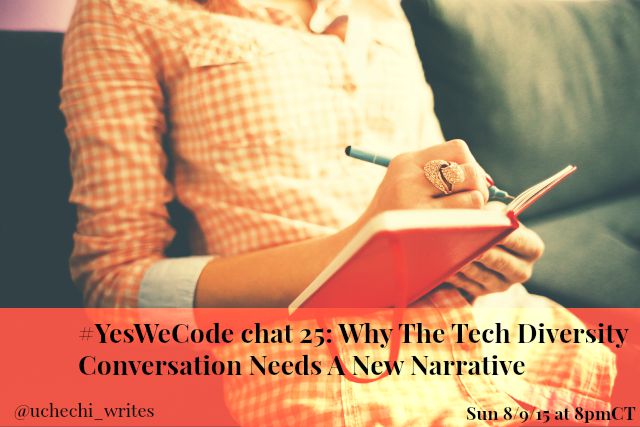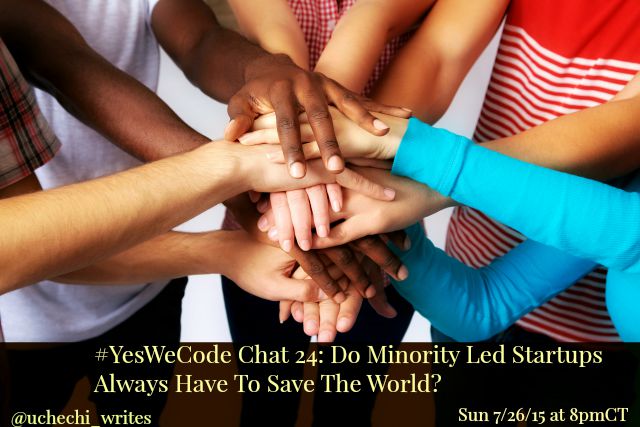
by Uchechi | Sep 12, 2015 | Blog
This week, Apple announced the new iPhone release for later this month. Around the world, customers will line up in Mexico City, Lagos, Lisbon and Manila to purchase Apples latest artistic release.In a world that has more mobile phones than toilets, it’s clear that global ad diverse customers make our products more profitable and valuable.
Isn’t it time we represent our world not just as consumers, but also as creators?
As tech innovators, how do we create user experiences that factor in the needs, desires and worldviews of global population?
Do we have a responsibility to innovate with a focus on global user experiences?
I think we do! As a UX Designer, I’m always thinking about how my Nigerian, American, Swedish, Mexican and Jewish family engages with the products I create.
How do I factor them into my design process?
The conversation about diversity in technology often centers around bringing diverse ideas to the table for the sake of inclusion, but the need for inclusion goes beyond fairness and equality. It also allows for better user experience, better design and more innovative products.
Stepping outside our comfort zone is not only necessary for self growth, it’s also good (no great) for business. The future of technology will focus on creating products for the more than 7 billion people in the world (4.5 billion have mobile technology) who look like less like the 19 year old white male Stanford grad and more like a kaleidoscope of ethnicities, languages and cultural contexts.
We are the answer to the question, “who will be best positioned to come up with products and services that will win in the global market.”
I think it’s time we make sure global centered UX is at the core of our tech diversity conversations and design innovation.
Questions to think about:
- What does global UX mean to you?
- Do you practice it?
- How has it impacted your design experience and perspective?
- As consumers, how would global centered design impact your user experience of a product?
- As creators, do we have a responsibility to “think globally?”
- As outsiders, do people of color have an advantage in the global market of tech products?
- If so how can we promote that?

by Uchechi | Aug 20, 2015 | Blog
When it comes to building and sustaining a company, culture is key. From startups like Amazon to Airbnb, startup culture conversations are at the center of current conversations.
Discussing startup culture might be a key part of engaging the issue of tech diversity.
Recently, President Obama hosted the first ever Demo Day at The White House. This event generated a conversation around tech diversity and the lack of it as a cultural issue. Regardless of what you believe on this topic, company culture does shape what is accepted and acknowledged as appropriate within a tech company.
I think it’s really important to ask ourselves about the cultures we’re trying to create and what roles we as founders play in supporting or dismantling certain assumptions and behaviors within our companies.
How does the culture we create impact the future of our companies? Does it matter? How do we make room for all of us? The single mothers, the full time parents/techies and everyone and anyone who might not be seen as a cultural fit in an industry that lacks diversity in almost every way.
Join us for the next #yeswecode chat to discuss startups, company culture and the tech culture we’re trying to create.
Questions to think about:
- How do we make diversity part of our company culture/DNA from the beginning?
- Which company culture elements are most important to you.? Why?
- Do startups founders have a responsibility to positively shape company culture from the beginning?
- What tips would you give to company founders about creating inclusive culture?
- How do we expand the conversation about startup culture to include everyone?
See you there!
Joining the #yeswecode chat for the first time? Check out the guidelines to help you make the most of it.
Photo Credit

by Uchechi | Aug 5, 2015 | Blog
#YesWeCode chat #25: Why The Tech Diversity Conversation Needs A New Narrative
Sunday 8/9/15
6pmPT/8pmCT/9pmEST
Two recent events influenced this Yes We Code chat topic. Last weekend was James Baldwin’s birthday and I celebrated by writing about the lessons I learned from him, and his take on how to go after what you want and actually get it. In his historic “Rap on Race” conversation with Margaret Mead, he talks about how he needed to “change the narrative” of what was expected for his life in order to change his life.
During #YesWeCode chat #24, we discussed the assumption/expectation of minority startup founders to create businesses focused on social good. While that wasn’t every founders experience and we didn’t come up with an answer, we did conclude that maybe we need to rethink how we view the following conversations within the tech diversity:
- Social good can also be profitable.
- Minority entrepreneurs can create companies that are profitable.
- The solution towards more tech diversity isn’t about one solution, but addressing the whole pipeline.
What if the way to really achieve tech diversity is to change the internal and external narratives we tell ourselves about what that means and what it will take? What if in order to engage this topic we need to know and understand the real underlying issues and concerns?What if we refuse to accept that lack of minority CS majors is at the heart of the lack of diversity in tech? What if we choose to rethink the expectations and assumptions we put on ourselves? What if, in the end, we need to “change the narrative” we’ve either created or accepted about what’s possible in the greater tech diversity conversation.
This Sunday, we’ll talk about this and more.
Questions to think about:
1. Is there a consistent tech diversity narrative?
2. What does it say?
3. What assumptions about tech diversity impact how you see yourself and your work?
4. If there are many tech diversity narratives, which ones do you think we need to change? Why?
5. How can we create a new narrative that includes the needs of youth, entrepreneurs and tech startup entrepreneurs?
New to the #yeswecode chat? Check out the guidelines to help you make the most of it!

by Uchechi | Jul 23, 2015 | Blog
Yes We Code chat 24: Do Minority Led Startups Always Have To Save The World?
Sunday July 26th 2015
6pmPST/8pmCT/9pmEST
Connect with me on Twitter @uchechi_writes
More and more companies are creating products and services for social good. From well known shoe companies like TOMS to local businesses promoting giving back to the community, the idea is a good one that can only continue to better the world we live in.
But what happens when creating a social good business is assumed, especially for minority entrepreneurs? I recently attended a dinner for minority entrepreneurs where got to talking about the assumption that minority founders are supposed to create startups focused on “social good.” During the conversation, we agreed that this expectation is not only a problem, but creates mixed messages for minority led startups. On the one hand, we’re supposed to be focused on making money and have an investment worthy business model. On the other hand, we’re supposed to do “social good” and create something that gives back to the community.
I have no problem with creating businesses for social good. I’d love to see more companies working to improve the world. The challenge I find with this notion is that this seems to be the companies that not only get funded, but this message is encouraged over and over again.
Funding sites like Kapor Capital focus on social good and that’s a positive, necessary thing, but how can we create companies that are profitable and may – or may not be – focused on social good? We’ll discuss this and more during the next yes we code chat.
Some questions to think about:
- What does “social good” startups mean to you?
- Do you feel a responsibility to “give back” via your company?
- Have you run up against funding obstacles because you’re not a “social good” startup?
- What do you think of startups like Tom’s shoes, who position themselves as social good?
- Do minority led startups always have to save the world?
Joining the chat for the first time? Check out the guidelines to help you make the most of it.

by Uchechi | Jun 14, 2015 | Blog, creativity
I didn’t major in CS
I didn’t go to UX design school. I don’t think it even existed when I graduated from college in 2001. While I didn’t know anything about user experience design, I did know that I was interested in human behavior and interactions. User Experience Designers come from all different majors and backgrounds.I thought I’d major in Environmental Science. I loved learning how things worked, especially in the environment.During the spring of my freshman year, I took a poetry class that would eventually lead me to a career in technology.
Poetry Taught Me To Love Creativity and Language
I know this doesn’t sound like a predictable path, but it came out of going for something that ignited my curiosity, and led me to a career I didn’t even know I’d want to pursue.I was lucky to be mentored by the late poet June Jordan. She was one of the most published black writers in US history and I found a resonance in our stories. She encouraged me to express myself, to take risks, to get on stage even when my nerves were fried and my poems were drenched in my own fear. She made it valuable to take risks for something important, which was finding and owning my voice.
It was UX love at first wireframe
Years later, I found myself with a career as a professional poet, teacher and online copywriter. I’d spend weekends performing at conferences, jails, schools and more. What I loved most about this work was that it made me engage with my audience in a way that brought us all closer together. I’d write a range of content and was always aware of the language I used and the emotions conveyed based on the words I chose.I loved how language had an impact and could affect how we felt about anything. I learned to be intentional with my language and to use it wisely to convey exactly what I wanted to say.
User Experience Design Was Similar to Poetry
Online copywriting led me to discover UX, and it was love at first wireframe. Something about User Experience felt familiar.
- I got to have a voice and to use it.
- I could create something that allowed me to engage with my audience of users.
- It allowed me to be intentional about language and to not waste words.
- I had to think about who my audience was, and create experiences they could connect to.
- My platform was no longer a stage, but was now online. The world could connect. The world became my users.
- I could still be very creative and use writing as a tool.
- UX was also all about great copy, and I loved writing great copy to create great experiences. I was in tech heaven.
Want to know how to get into a tech career?
Start with finding your voice
If you’re headed to college, everyone will want to give you advice about what you should major in. You don’t know me and you might not want my advice, so I’ll tell you what I believe instead. I believe true creativity is rooted in any discipline that allows you to find a voice and to believe that your voice matters. Once you find that, you can express it in several ways (poetry, fine art, technology), but you have to trust that your perspective has value.
Suggested Classes To Take (You can do these now, even if you’re not in college anymore):
- Take classes that help you find your voice. Theater and creative writing classes are great for this.
- Take classes that reinforce the idea that mistakes are okay, and sometimes your best way of learning. Art classes are great for this.
- Take classes that encourage you to get up and share your perspective. Often in UX, you end up working in teams and need to be able to explain your ideas to others. Public speaking classes are great for this.
- Do something that allows you to take risks. Reading a poem during open mic night at your local bar is a great way to do this.
- Take classes in Architecture, which allows you to understand structural planning, which will help you in User Experience Design.[“Tweet “Creativity is rooted in the belief that you have a voice and that your voice matters enough to share it with the world.”]
Conclusion:
As a tech entrepreneur, I often get asked how I found this career path. My first response is usually something like this: “No, I didn’t major in CS, but I did study creative writing and education.” I was obsessed with language, perspectives and what it meant to have a voice and to trust that voice. It was trusting that voice that led me to love language enough to pursue a writing career, which led to online copywriting and then to UX. The skills I learned as a poet have also applied to my UX career. If you want to know how to get into tech, my advice is to find your creativity by finding your voice.How did you get into tech? How did you find your way to teI’d love to know your story. Hit me up in the comments!




